- Home
- Peter Grainger
An Accidental Death
An Accidental Death Read online
AN ACCIDENTAL DEATH
A D C SMITH INVESTIGATION
Peter Grainger
Chapter One
“My name is Melanie Carter. I am a sixth form student at St Martin’s Comprehensive in Upham Market. This is my statement about what happened on Saturday the 24th of August, 2011 – what happened to Wayne Fletcher.
“We arrived at Vine’s Drove after lunch. Most of us were still on holiday but a couple of the boys had left school in June. Wayne had already got a job, with his uncle I think. He said that he would soon be making more as an electrician than we would with our degrees, he talked about it a lot that afternoon. I think he was a bit upset at leaving, to be honest, he was trying to make it seem like it was what he wanted but I wasn’t convinced. I have known Wayne for at least ten years, we were at primary school together.
“We all sat on the riverbank, in the meadow and close to the cars. It was really hot, the hottest day of the year. We were all drinking, and some of us were smoking too; I have been told that I don’t have to say exactly who was doing what. There was lots of beer and lager. At one point when we thought we had run out, Wayne went back to Nadia’s car and got another twenty four pack out of the boot.
“There were not many other people about on the bank, I can only remember seeing one person walking a dog, but there were some boats going up and down the river. At about 4 o’clock three of the boys were in the water when some canoeists came by, and they started splashing them, the boys splashing the canoeists. There were children in one of the canoes and the man in it got angry. He was shouting at all of us, not just the boys in the water, things about modern youth, like we hear all the time. We were shouting back, everyone was laughing but the boys let them go, they never touched them. Wayne wasn’t in the water then, he was on the bank with Nadia. A little after that, Nadia left, she had to go to work, but Wayne stayed on.
“Later on, about 5 o’clock, another canoe appeared. It was going upstream towards Broughton Staunch. Wayne saw it first and he jumped up and said something like ‘This one’s mine.’ Nobody tried to stop him – we were still laughing about the last ones – we just watched, all of us. Wayne is a good swimmer but the man in the canoe had seen him coming out towards him and he went past him easily. Wayne was shouting and laughing to us. Then he swam after him, really fast, front-crawling like he meant to catch him. The river bends around to the left and they disappeared out of sight.
“After about a quarter of an hour, some of us started to get worried but the others said it was typical Wayne, that he was messing about, playing some sort of joke. The other five went at about 6 o’clock. Steven, Chrissie and me were left. We searched up the river bank but it is overgrown with bushes and you can’t get very far; we shouted but heard nothing back. Steven was really good. He went into the river and swam upstream around the bend. He was gone a long time and we started to think that something had happened to him as well. When he came back he said there was no sign of anyone.
“We didn’t know what to do. It was after seven by then. We didn’t have any numbers for Wayne’s family. We called his number just in case but it rang on the bank behind us because it was in his jeans. All his clothes were still there except his swimming trunks, obviously. We waited another few minutes and then we called the police. When we told them Wayne was seventeen, they said not to worry too much, that he had probably just gone home.”
‘Come in, Smith. Take a seat.’
Detective Superintendent Allen gestured to the one chair in front of his desk, clearly placed there for this purpose. Smith stood by it, waiting until the senior officer himself was ready to sit. Automatically Smith’s gaze took in the sheaf of papers and the two manila folders that lay on the desk; standard station issue, he thought, no sign of paperwork from above there.
‘So – welcome back! How long has it been?’ Allen lifted the top sheet as if he didn’t know the answer and needed to check.
‘A week, sir.’
‘A well-deserved break from the front line. I hope you made the most of it!’
Smith said nothing, just held the younger man’s gaze steadily.
‘The two days you weren’t in the building won’t need to be counted against your holiday entitlement.’
‘I’d rather they did, sir.’
‘That really isn’t required, Smith. In fact, I’ve already given instructions.’
‘Thank you, sir. But I’d rather that they did, all the same.’
Allen made a note on his desk pad.
‘And you are fully recovered?’
‘I wasn’t aware that I’d been ill, sir.’
‘Ah, well, of course, not ill exactly…’
‘Not ill at all, sir, if you don’t mind me saying. Feeling remarkably healthy, considering.’
‘Considering what?’
‘Just my age, sir.’
‘Oh. I see… Have you had any more thoughts about retirement, while we’re on the subject?’
Allen found the detective’s face was impassive, impossible to read – confound the man.
‘Well, you must forgive me, sir, I didn’t realize we had changed the subject. But no, no more thoughts at present. Hopefully there are a few more miles left in the tank.’
‘Thirty years, Smith – more than they got for the Great Train Robbery! You’ve done your bit, you know. And the new regulations don’t apply to you, you could go with full pension. I know plenty of men who would jump at the chance.’
‘So do I, sir.’
Allen seemed to sag a little in the middle, and his hand returned idly to the papers on the desk.
‘In fact, sir, I’ve been reading up on the new regs and it seems that we will be able to continue even after sixty as long as we’re fit and pass the annual performance review. I think that if I joined a gym and kept myself fit, I could go on to sixty five.’
‘Really?’
‘Yes sir.’
‘Good God…I hope I’ll be gone myself long before then. You don’t fancy a spot of fishing or golf?’
‘I’m sorry, sir? Is that an invitation?’
‘Eh? No, of course not. I just meant that there’s more to life than this job, Smith. It’s getting harder, as you know. This recent business, the Macpherson case…’
Smith’s face became imperceptibly more impassive, his gaze imperceptibly more fixed on the man in front of him, the man he had once known as a probationary PC on the streets of Kings Lake. They were round to it at last.
‘Sir.’
‘I don’t want any animosity from any of the sides involved, Smith. The inquiry had to take place, you know that, just as you know that no blame attaches to you or to DI Harrington. It never did but you know the procedures, how important the procedures are these days. Everyone was exonerated and it doesn’t need to be dragged up again. Not that I am suggesting you are the kind of person who-’
‘Everyone was exonerated, sir?’
‘Yes, they were.’
‘And where is DI Harrington at the moment, sir?’
‘It was a voluntary transfer, at Detective Inspector Harrington’s request.’
‘Oh, I see, sir.’
It seemed that Superintendent Allen was feeling a little hot under the collar – he probably wanted to loosen it and take off the expensive-looking and rather tight suit jacket but that would undermine the formality of the situation. In the past, Smith thought, you came back after the flu or an injury by signing in and chucking out the rubbish in your pigeon hole; now it was a formal welcome-back-to-work meeting every time. No wonder there are more chiefs than Indians.
‘Anyway, I think we’ve cleared the air, said what needed to be said, don’t you?’
‘Absolutely, sir.’
‘Good
… Good…’
There was clearly more to come, and Smith waited, his fingers interlaced, sitting upright, his back never touching the chair behind him, as if at any moment he would enter a state of mindful meditation. Something had to be said about Wilson.
‘With regard to the, er, the chain of command… Smith, you are a highly experienced officer, one of the most experienced in the division. You are also, to my knowledge, the only officer currently working as a detective sergeant who has experienced the higher echelons of rank. That, of course, was your choice and your right, odd though it seemed to some.’
‘I think some found it incomprehensible, sir.’
‘Yes, quite.’
Allen could certainly be counted among that group of elite thinkers.
‘But obviously, as a DS you continue to be responsible to someone in the rank above you. That’s how it works…’ and he paused here as though he had just discovered this truth for the first time. ‘However, for reasons that we have just established, and in the absence of Harrington, I’m asking you to report for now to Detective Inspector Reeve.’
‘I see, sir. Very good.’
Allen watched him from across the desk as a frog might watch a wasp, wondering whether the risk could in any conceivable way be worth it.
‘Will that be all, sir?’
‘Yes, Smith, that will be all.’
Allen watched the door close behind the small, wiry figure of the most upright, unconventional and awkward officer under his command, and muttered to himself, ‘For now.’
Charlie Hills was on the duty desk, as big, bluff and bald as ever. Next to him was a tall, thin and blond-haired youth, looking at, and apparently earnestly studying, the duty log, or at least the part of it at the end of Charlie’s finger. At Smith’s approach they both looked up.
‘And the wanderer returns! Good morning, DC. How did it go?’
Charlie nodded towards the stairs that led up to the suite of offices that Smith had just left, eyebrows raised.
‘Wants me to take up fishing. Or golf.’
‘I can see that, you in a nice pullover and slacks, drinkies in the bar… Or sitting on a basket in the rain down by the river.’
‘Yes – and I can see you in a wooden box if you’re not careful. Excuse me, sonny.’
The young man looked startled for a moment.
‘Sir? Er, yes, sir?’
‘If you’ve come in to report that your tricycle has been stolen, shouldn’t you be on this side of the counter?’
This couldn’t be his first experience of station banter but he still looked from one to the other of the older men, uncertain how to respond.
‘DC Waters, this is Detective Sergeant Smith – DS Smith meet DC Waters.’
Smith saw the reaction immediately – eyes widening a fraction, a slight straightening up, as a young soldier might on his first encounter with gold braid and medals.
‘Hello, Waters. Got a first name?’
‘It’s Christopher, sir. Chris.’
‘Hello Chris, then. No need for the sirs. On the development programme?’
‘Yes, s…’ he blushed, and Charlie had to look away.
‘How far?’
‘Just beginning my second year.’
Charlie said, ‘Mostly classrooms up to now. He’s here for a bit of practical.’
Smith nodded and looked around at the empty reception area.
‘Talking of which, has Kings Lake been put under martial law in my absence? I know I’m not easily replaced but… Or does crime only happen when I’m actually in the building? I’ve often wondered about that.’
‘Just a quiet morning, DC. It won’t last.’
‘No, it never does. I’ll see you both later.’
As he continued towards the work-rooms he heard Charlie’s voice again, stopped and turned.
‘DC? Good to have you back.’
‘Thanks, Charlie.’
He went left and into the open-plan staffroom. The pigeon holes were on the right and he headed straight for them; being back in the building had reinvigorated him somehow, and he was keen to get going on something, still keen, still crazy after all these years, the tune forming in his head as he took up the first batch of papers. Smith had decided a while ago that for some reason his ears seemed to be ageing less quickly than the rest of him; the station was so unnaturally silent that he could still make out the voices of the two men he had left at the duty desk. Waters was speaking quietly – Smith heard his own name mentioned, and then something that ended in a question. Charlie’s voice was louder – ‘Yes, that’s him.’ A pause and then more from Waters; Smith could only pick out two words – ‘Andretti’ and ‘retired’. Charlie answered again, ‘Yes, the same. Never retired, though plenty of people wish he had – not only on the other side either but I shouldn’t say that to your innocent ears… Lot of respect…’
Smith shut it off then and almost immediately the front desk phone was ringing. Andretti was ten years ago, and he was surprised that anyone still talked about it. He closed his eyes to see if the girls were still there, knowing that they always would be, the four of them appearing to him in the correct sequence, in the order of their discovery in the dunes, their bodies white, cold and naked on the sand. A brilliant team on it, the best he’d ever had, for month after month… And in the end it was one lucky observation by a uniformed sergeant that broke it.
Piece by piece he fed the contents of his pigeon hole into the shredder, which stood conveniently within arm’s reach, as if somebody knew. Pension plan updates, divisional golf tournament – was there a fishing one? – changes to uniform replacement procedures, federation warnings about further staffing cuts, overtime payments under threat, a copy of the letter he had already received at home giving him the outcome of the inquiry, that word ‘exonerated’ again, a pay slip which he didn’t shred after last year’s income tax fiasco.
Finished, he looked around the room but still no-one else had arrived. There must be case meetings going on, and he felt a twinge of annoyance that he wasn’t in one, getting up to speed, giving the mind some focus, something to do. If Alison Reeve wasn’t taking a meeting she would be in her office – might as well get that over with as well.
Chapter Two
Smith knocked once and opened the door a fraction; you could never be sure when entering a female officer’s room. She was leaning forward over a large table covered in papers and photographs of people, resting both hands on it as if trying to prevent the whole thing from taking off, the long dark hair screening her face. Seeing him, she straightened up and immediately put out her hand. He took it; warm, slender, pale and intense.
‘David, it’s good to have you back. I hoped you’d come straight up.’
They sat in two comfortable chairs close to the window that overlooked first the car park and then an estate of light industrial units that made up one side of Kings Lake’s economic character. In the further distance were the cranes at the docks, set against a fringe of grey that only locals would recognize as the North Sea.
Smith looked across at the table.
‘Something interesting?’
‘It’s a fraud. Not mine, thank God, I’m just a second pair of eyes on it.’
She smiled at the face of dislike he pulled, and said, ‘I hate numbers. I only scraped a grade C in Maths. It still haunts me.’
‘The past has a habit of doing that, ma’am.’
‘Don’t you dare start that!’
‘Well, we have to say something. Out there – in meetings. I’m OK with it – ma’am.’
‘It’s just wrong! Miss Parker taught me Maths, and if we met now she would still be Miss Parker – and there are no circumstances under which she would ever have to call me ‘Miss’ are there? You can’t call me “ma’am”, it’s not right.’
‘Maybe not in here, then. But these things matter, in a daft sort of way. People notice, it affects relationships.’
‘Just don’t look at me if you sa
y it, out there in some meeting.’
‘It might not be for long, once we get a new DI, assuming Harrington isn’t coming back.’
‘Harrington won’t be back. And don’t count on us getting another DI. These staffing cuts are for real, David. I think they’ll use it as an opportunity.’
‘And Wilson?’
She looked at him properly for the first time, with the long, blue stare that he had seen disconcert some difficult suspects.
‘Wilson is still reporting to me. I don’t have a problem with that.’
It was a statement and a question rolled into one – Smith’s response was a simple nod of agreement. She smiled and sighed, and Smith guessed she had more difficult things to say before he left her office. And he was sympathetic, even felt a little responsible for putting a good detective in this sort of situation. His old boss, DCI Miller, had a very simple, very effective system of staff appraisal – people were either ‘a good hand’ or they were not. Alison Reeve would have made the first list.
She seemed to guess his thoughts.
‘This is why they discourage it, isn’t it – the stepping down?’
‘One of the reasons, no doubt.’
‘I know you’re fed up with being asked why… But how did you manage it?’
‘The truth?’
She nodded.
‘Some influential people owed me. I called in a favour or two.’
‘You mean you knew where the bodies are buried!’
‘And they haven’t found them all yet.’
She stood up, walked across to her desk and picked up a folder.
‘I can’t give you much, not to start with. My hands have been tied.’
She looked up, ready for it as he said, ‘Well, whatever floats your boat…’
‘I am trying to apologise! You won’t get a team of DCs straight away, things are still sorting themselves out, but it shouldn’t be too long. You’re going to hate some of this, though. You’ve got one lot of awareness, and one lot of liaison. They aren’t long term but they do require CID input.’
‘Awareness of?’
‘Drugs, talking to local sixth forms.’

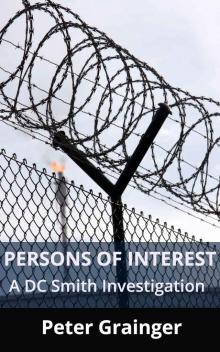 Persons of Interest
Persons of Interest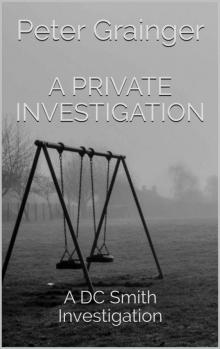 A Private Investigation
A Private Investigation Songbird
Songbird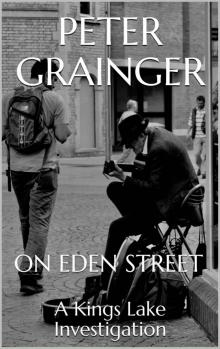 On Eden Street
On Eden Street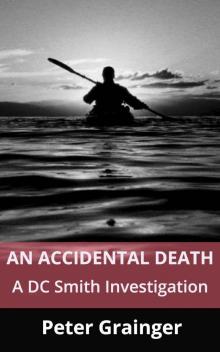 An Accidental Death
An Accidental Death Time and Tide
Time and Tide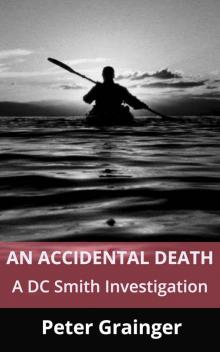 An Accidental Death: A DC Smith Investigation
An Accidental Death: A DC Smith Investigation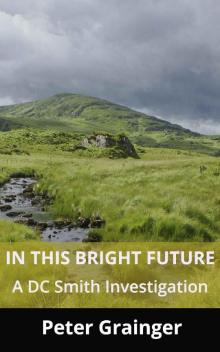 In This Bright Future
In This Bright Future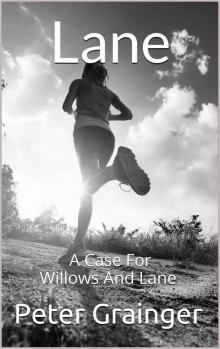 Lane: A Case For Willows And Lane
Lane: A Case For Willows And Lane The Rags of Time: A DC Smith Investigation
The Rags of Time: A DC Smith Investigation Luck and Judgement
Luck and Judgement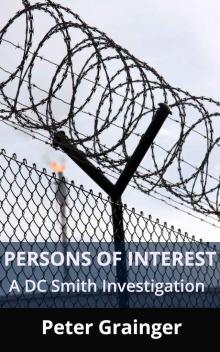 Persons of Interest: A DC Smith Investigation
Persons of Interest: A DC Smith Investigation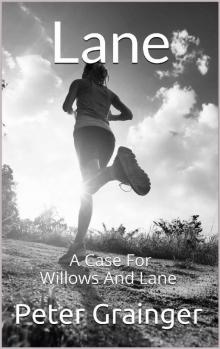 Lane
Lane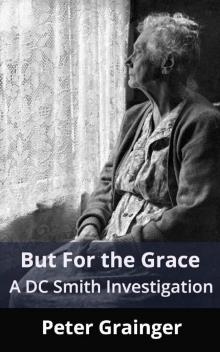 But For The Grace
But For The Grace Time and Tide: A DC Smith Investigation
Time and Tide: A DC Smith Investigation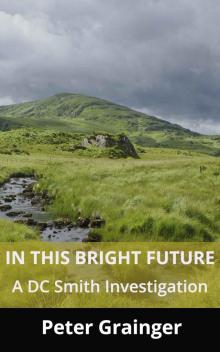 In This Bright Future: A DC Smith Investigation
In This Bright Future: A DC Smith Investigation The Rags of Time
The Rags of Time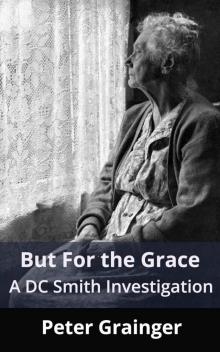 But For The Grace: A DC Smith Investigation
But For The Grace: A DC Smith Investigation Luck and Judgement: A DC Smith Investigation
Luck and Judgement: A DC Smith Investigation